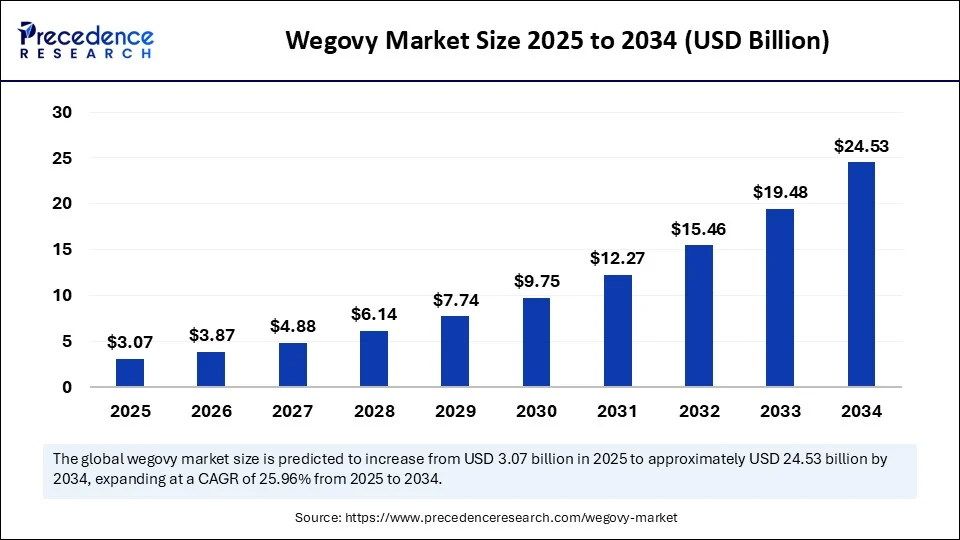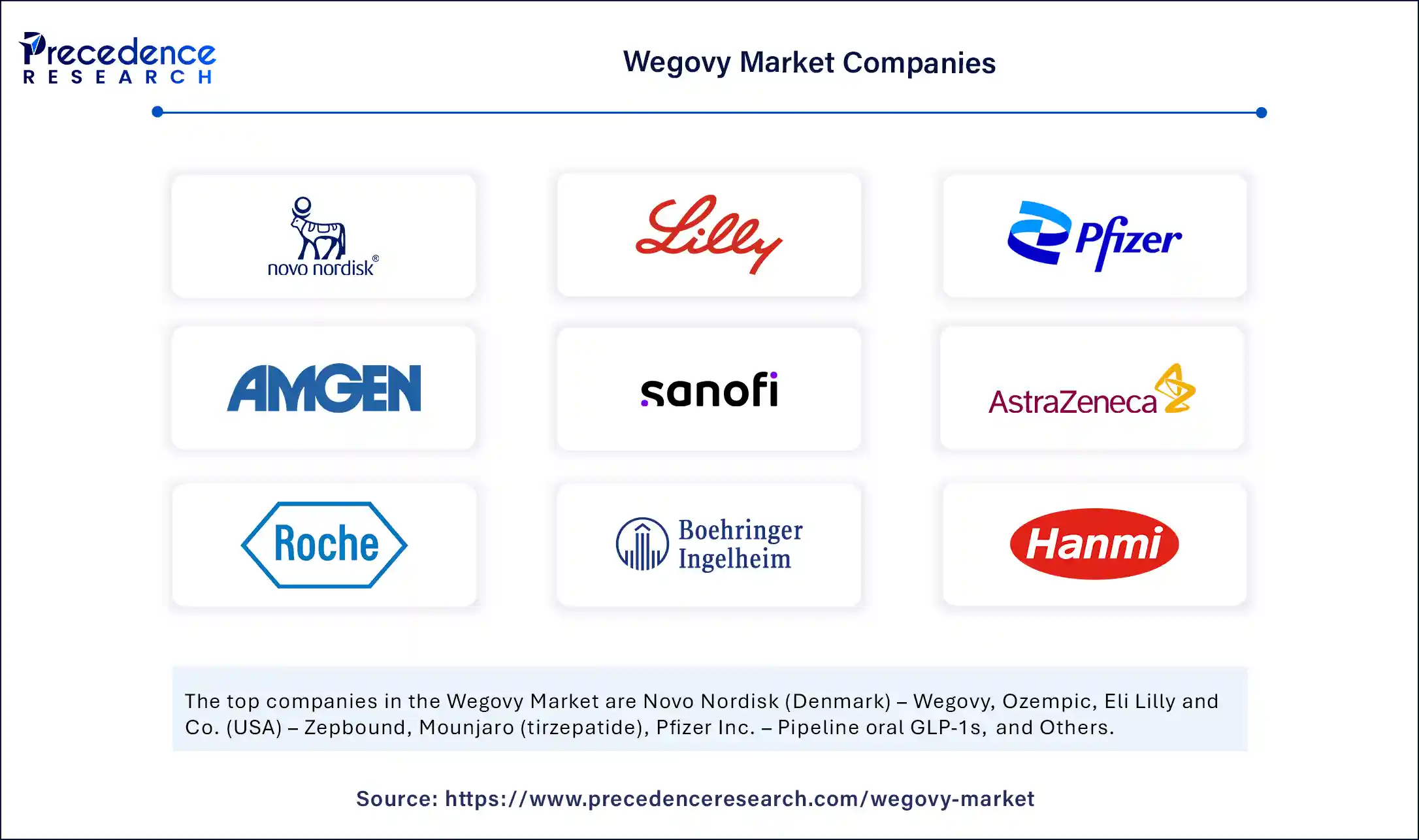
- North America led the market in 2024 with a 48% share, while the Asia Pacific region is forecasted to register the highest growth rate throughout the forecast period.
-
By drug type, branded semaglutide dominated the market with a 95% share in 2024, whereas biosimilar semaglutide is expected to witness substantial growth in the coming years.
-
Based on the route of administration, subcutaneous injection accounted for the entire market share (100%) in 2024, with oral formulations anticipated to grow significantly between 2025 and 2034.
-
In terms of dosage strength, the 2.4 mg/week segment held the highest share at 45% in 2024, while the 1.7 mg/week segment is projected to expand at the fastest CAGR.
-
By patient demographics, adults (18–65 years) represented the majority of users with a 70% share in 2024, while the adolescents (12–17 years) segment is set for notable growth.
-
Considering BMI category, the BMI ≥30 (obese) segment accounted for 65% of the market in 2024, whereas the BMI 27–29.9 with comorbidity group is projected to grow significantly.
-
By distribution channel, retail pharmacies held the top position with a 48% market share in 2024, while online pharmacies are expected to grow rapidly during the forecast period.
-
In terms of application, obesity management led with a 60% share in 2024, and cardiovascular risk reduction is forecasted to expand at the fastest CAGR through 2034.
-
Among end users, hospitals captured the largest market share of 40% in 2024, while weight management clinics are projected to grow significantly in the coming years.
-
By pricing tier, the high-income market dominated with a 60% share in 2024, and the middle-income segment is expected to expand at the fastest pace over the forecast period.
Role of AI in Wegovy Market
Artificial intelligence and digital health platforms are playing an increasingly critical role in the Wegovy market. AI tools are being used to identify suitable patients for treatment by analyzing electronic health records and lifestyle data, helping physicians make faster and more accurate prescribing decisions. Smart devices and wearables are enabling continuous monitoring of side effects, injection adherence, and weight loss progress, which improves patient engagement and therapy outcomes.
Additionally, AI-powered analytics support pharmaceutical companies in optimizing marketing campaigns, segmenting target populations, and adjusting pricing strategies based on behavioral and regional data, thereby enhancing overall commercial efficiency.
Market Scope
| Report Coverage | Details |
| Market Size by 2034 | USD 24.53 Billion |
| Market Size in 2025 | USD 3.07 Billion |
| Market Size in 2024 | USD 2.44 Billion |
| Market Growth Rate from 2025 to 2034 | CAGR of 25.96% |
| Dominating Region | North America |
| Fastest Growing Region | Asia Pacific |
| Base Year | 2024 |
| Forecast Period | 2025 to 2034 |
| Segments Covered | Drug Type, Route of Administration, Dosage Strength, Patient Demographics, BMI Category, Distribution Channel, Application/Indication, End User, Pricing Tier and Region |
| Regions Covered | North America, Europe, Asia-Pacific, Latin America, and Middle East & Africa |
Wegovy Market Dynamics
Growth Drivers
The most significant growth driver for the Wegovy market is the global rise in obesity and associated comorbidities, such as type 2 diabetes and cardiovascular disease. As sedentary lifestyles and processed food consumption become more common worldwide, the need for effective pharmacological interventions is escalating.
Moreover, public health campaigns and medical guidelines are increasingly emphasizing weight loss as a preventive healthcare strategy. Positive clinical outcomes for Wegovy, including substantial weight reduction and improved metabolic parameters, have strengthened healthcare provider confidence in prescribing the drug, further accelerating its adoption across diverse patient populations.
Challenges
Despite strong clinical success, the market faces challenges that may limit growth, particularly in cost-sensitive regions. The high price of Wegovy poses affordability issues for many patients, especially in low- and middle-income countries where insurance penetration remains low.
Additionally, supply constraints and disparities in healthcare access continue to hinder widespread adoption. Competitive pressure is also intensifying with the emergence of similar GLP-1 therapies, notably Eli Lilly’s Zepbound (tirzepatide), which has demonstrated superior weight loss outcomes in clinical trials and is rapidly gaining market share, especially in the U.S.
Opportunities
Ample opportunities exist for market expansion, especially in underserved regions such as Asia-Pacific and Latin America, where obesity rates are climbing, and governments are ramping up public health initiatives. The development of oral GLP-1 formulations is another promising frontier, offering easier administration and potentially broader patient compliance.
Furthermore, the integration of digital health tools to support patient adherence, monitor side effects, and personalize therapy represents a major opportunity for improving treatment outcomes and market differentiation.
Wegovy Market Segmentation
The Wegovy market can be segmented based on indication, route of administration, distribution channel, and dosage form.
By indication, Wegovy is primarily prescribed for obesity but is also being used to manage type 2 diabetes and related comorbidities. As obesity often coexists with hypertension, insulin resistance, and cardiovascular risks, the drug’s clinical application is broadening.
In terms of administration, Wegovy is currently available as a subcutaneous weekly injectable (2.4 mg), which has become the standard due to its efficacy and convenience. However, pharmaceutical innovation may introduce oral versions in the future, further boosting accessibility.
By distribution channel, retail pharmacies dominate the landscape due to the drug’s outpatient prescription model, though hospital and online pharmacies are gaining importance. Regarding dosage form, the current weekly injectable remains the gold standard, but there is growing interest in more flexible dosing regimens.
Regional Insights
North America led the Wegovy market in 2024, accounting for 48% of the global revenue share. This dominance is attributed to early FDA approval, widespread insurance reimbursement, and a high prevalence of obesity and metabolic syndrome in the U.S. and Canada. Moreover, Novo Nordisk’s strategic collaborations with healthcare providers and insurers have accelerated product uptake. The Asia Pacific region is projected to be the fastest-growing market, driven by urbanization, dietary changes, and the increasing incidence of obesity in countries such as India and China.
Government-backed health awareness campaigns and growing investments in chronic disease management are also supporting growth. In Europe, market penetration is expanding steadily following European Medicines Agency (EMA) approval and rising acceptance of pharmaceutical weight-loss interventions, particularly in Germany, the UK, and Nordic countries where obesity has become a significant public health concern.
Wegovy Market Companies

- Novo Nordisk (Denmark) – Wegovy, Ozempic
- Eli Lilly and Co. (USA) – Zepbound, Mounjaro (tirzepatide)
- Pfizer Inc. – Pipeline oral GLP-1s
- Amgen Inc. – GLP-1/GIP dual agonists in trial
- Sanofi S.A.
- AstraZeneca plc
- Roche Holding AG
- Boehringer Ingelheim
- Hanmi Pharmaceutical
- Structure Therapeutics
- Oramed Pharmaceuticals
- Cytodyn Inc.
- Altimmune Inc.
- Innovent Biologics
- Zealand Pharma
- Gubra ApS
- BioAge Labs
- Sciwind Biosciences
- Terns Pharmaceuticals
- China Meheco
Conclusion
The Wegovy market is poised for exponential growth, reshaping the landscape of obesity treatment and chronic disease management. With a robust CAGR of 25.96% through 2034, the market is set to benefit from increasing global health consciousness, improved insurance access, and clinical confidence in GLP-1 receptor agonists. Strategic investments in digital health, emerging market expansion, and new delivery formats such as oral formulations will be crucial in sustaining long-term momentum. As the obesity epidemic continues to escalate globally, Wegovy and similar therapies are likely to become cornerstone treatments in modern healthcare systems.
Segments Covered in the Report
By Drug Type
- Branded Semaglutide
- Wegovy (Novo Nordisk)
- Generic/Biosimilar Semaglutide
- Pipeline biosimilars (2027 onward)
By Route of Administration
- Subcutaneous Injection
- Oral Formulations
By Dosage Strength
- 0.25 mg/week
- 0.5 mg/week
- 1 mg/week
- 1.7 mg/week
- 2.4 mg/week
By Patient Demographics
- Adults (18–65 years)
- Elderly (>65 years)
- Adolescents (12–17 years)
By BMI Category
- BMI 27–29.9 (Overweight, with comorbidity)
- BMI ≥30 (Obese)
By Distribution Channel
- Retail Pharmacies
- Hospital Pharmacies
- Online Pharmacies
- Specialty Clinics
By Application/Indication
- Obesity Management
- Type 2 Diabetes with Obesity
- Cardiovascular Risk Reduction
- Metabolic Syndrome
By End User
- Hospitals
- Ambulatory Surgical Centers (ASCs)
- Weight Management Clinics
- Home Care Settings
By Pricing Tier
- High-Income Market (Cash Pay or Reimbursed)
- Middle-Income Market (Insurance Dependent)
- Low-Income Market (Access-Limited, Emerging demand)
By Region
- North America
- Europe
- Asia Pacific
- Latin America
- Middle East & Africa
Also Read: Lipase Inhibitors Obesity Drugs Market
You can place an order or ask any questions, please feel free to contact at sales@precedenceresearch.com |+1 804 441 9344
- Myopia Treatment Devices Market Size to Reach USD 38.51 Billion by 2034, Growing at a CAGR of 7.86% - September 1, 2025
- Pill Timer Market Size to Hit $2.94 Bn by 2034 | 9.02% CAGR Growth Forecast - August 12, 2025
- Blood Glucose Monitoring Market Size to Worth USD 25.53 Billion by 2034 - August 11, 2025
